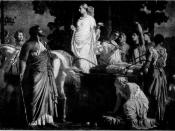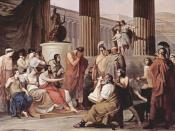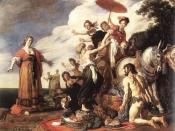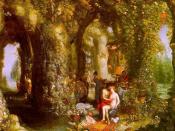In Homer's The Odyssey, women are looked at in two ways; as being the evils in the world and hindering on Odysseus's homecoming or as being loving and faithful. On his journey home, Odysseus weaves his way through many hardships and temptations that are created by the women he meets on his voyage back to Ithaca. Calypso and Nausikaa play a large role in representing temptation while Penelope represents loyalty for she was the only good and loyal woman who waited for Odysseus to return home unlike Clytemnestra who found a new lover.
Calypso, a nymph from the island of Ogygia, took in Odysseus who had been shipwrecked after the Trojan War. After falling in love with him and wishing he would stay forever, she offered him the gift of immortality and becoming ageless. But after seven years of being her sex slave, Odysseus denied her for all he wanted to do was return home, considering he had not been there in over twenty years.
When he first arrived he was overwhelmed by Calypso's great beauty and the beauty in the island. He was tempted to stay and not return home because she was so gorgeous and he had the chance of sleeping with her every night. But then Calypso fell madly in love with him and would persuade Odysseus into seducing her every night. And soon those persuasions would no longer work because Odysseus did not find it as pleasurable and force became her new way of performing the task. The following quote shows that Odysseus was no longer interested in having these kinds of relations with Calypso even though she still wanted to and achieved in doing so every night.
"The sweet days of his life time,Were running out in anguish over his exile,For long ago the nymph had ceased to please.
Though he fought shy of her and her desire,He lay with her each night, for she compelled him" (page 85 line 159).
This hindered on Odysseus's trip back because he had to resist her temptations since all he wanted to do was get home and see his wife Penelope. At this point getting home was top on his list of priorities. If he never would have landed on Calypso's island, then he could have gotten home a lot quicker and would not have had to experience the troubles of temptation which Calypso brought upon him.
Hindering on his return home is the temptation Odysseus encounters when meeting a beautiful goddess on the island of Skheria. After leaving Calypso's island, Odysseus reaches the shores of Skheria where he lays down to sleep after a long adventure at sea and the next morning was awoken by the princess Nausikaa. The moment Odysseus sees the princess he falls for her instantaneously because her beauty was so great that he couldn't decide if she was a god or a mortal. Odysseus was so overwhelmed by her beauty that he stated "Never have I laid eyes on equal beauty/ in man or woman. I am hushed indeed" (page 103 line 172). This shows his temptation because he thinks she is absolutely gorgeous and would love to stay with her for the rest of his life. But he knows that if he does, then he would never see Penelope again and that is not what he wants. He was later on presented with the choice of marrying the beautiful princess or to receive assistance with returning home to Ithaca. He easily could have chosen to stay and live with Nausikaa forever because she was far more beautiful than his wife Penelope. She tries to tempt Odysseus to stay by telling him that he owes her his life because she was the one who saved him. Even though he wants to stay and marry Nausikaa, his faithfulness for Penelope keeps him from becoming victim of Nausikaa's temptations.
For twenty years, Penelope waited for her husband Odysseus to return home after the war at Troy without even knowing if he was dead or alive. During this long painful wait for his arrival, she promised her many suitors that once she was done weaving her father-in-law's shroud; she would pick one of them to marry. To prolong a relationship with any of the suitors she would weave by day, and undo it every night. "So every day she wove on the great loom/ but every night by torchlight she unwove it;/ and so for three years she deceived the Akhaians" (page 22 line 112). With this, she was able to keep the suitors on hold for sometime until they eventually figured out her trick. She has been one of the only loyal women in The Odyssey because even though she had many suitors that she had the chance of marrying, she never came close because she wanted to be faithful to Odysseus for when he would return home. She was loyal to her husband unlike Agamemnon's wife Clytemnestra. During Agamemnon's absence his wife lost all faith for him and fell in love with Aegisthus. Not only did she fall in love, but when he came back from the war they had a plan for destruction and murdered him at his celebration banquet for returning home. This is an example of where temptation takes over and causes someone to do something that would be considered evil. With Penelope, she did not let herself become a victim of the temptation from her suitors, for she wanted to remain faithful to Odysseus when he came home. Since he had been gone twenty years, and all the other husbands had already returned home, she had no idea if she was ever going to see her loving husband again, but this did not stop her from keeping her faith for Odysseus.
While Penelope was a symbol of faith and remained loyal for Odysseus, Calypso and Nausikaa were both symbols of temptation on Odysseus's journey home. Those two women gave Odysseus a lot of temptation which created hardships for him on his journey home. The women in The Odyssey play a large role in the epic, weather it be representing the evils or the good things in the world.
Reference: Homer's "The Odyssey"







